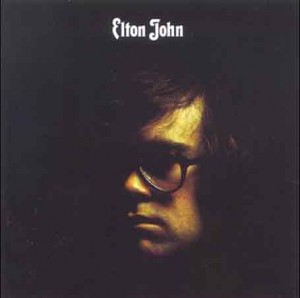
A Somehow Enigmatic Cover, Don't You Think?
Elton’s rise to fame was not that immediate as many often think. He had been covering other people’s songs for some time, not to mention being a paid songwriter along with Bernie for longer than was fulfilling. His first solo album went unheeded, despite oozing enthusiasm from every fiber.
If anything, his career was a matter of different pieces falling into position – his lyricist, his producer, his arranger and finally his classic band. On this, his second album (and the one that broke the commercial apathy) we see the addition of two of these figures, namely producer Gus Dudgeon and orchestral arranger Paul Buckmaster. They all had some heavy names on their resumes such as David Bowie and Eric Clapton, and the moment they agreed to work with Elton anything he would put out was to be digested differently, because their experience was to be felt in the final product .
While the energy remained, many things changed from the debut album. For a start, Elton’s style was more focused: the piano was made the touching stone of the record, as it was only logical. The memorable passages here are the ones Elton plays – there is no equivalent on “Elton John” to a song like “Sails” from the debut, “Empty Sky”. I had greatly enjoyed that one (remember how I said I preferred “Empty Sky” on isolated spots over “Elton John”? That was one such spot). But it was natural that anything that diverted the focus from Elton that markedly had to go. And Elton’s voice now remains mostly uniform. I am sure that was Dudgeon’s direct influence at play.
The other main development (and a standby from this point onwards) was to be the orchestrations provided by Buckmaster. These elevate the songs without ever eclipsing Elton’s performance, as it is the case with “The Greatest Discovery”, and he also crafts an intricate introduction to “60 Years On”, a song that announced that the theme of Elton and Bernie’s forthcoming record was already delineated by this point.
For the first time, Elton was to see some serious chart action – his standard “Your Song” was part of the record, and an obvious single. To me, it is a quintessential Elton song – something which is easy to criticize because it invites criticism for the obvious disposition of parts. And yet, these parts are presented in a way that is still admirable – rather, Elton always knew how to make the obvious sound obvious and yet more heartfelt than ever. He was always able to bring even the most mundane or plain lyric into its force. Just listen to the way he sings “The Cage” here, or his phrasing when he sings “Godammit you’re all gonna die” on “Texas Love Song” a little down the line (from the album “Don’t Shoot Me, I’m Only The Piano Player”) and you will realize that actual conviction and sentiment can turn a glass of water into enough alcohol to dizzy the whole crew of the Black Pearl and an army of Cossacks to boot.
On the other hand, Bernie was to remain mostly unchanged for a long, long time. Generalizing, his early lyrics can be called more adventuresome, yet when they fall flat you have to run for cover. And sometimes they do a little of both succeeding and failing – a representative case would be “Take Me To The Pilot”. You can’t criticize the words in terms of meaning – he willingly conceded they are randomized sentences. And yet, Elton sings them with such a conviction that one ends up making a reading that seems to stand beyond good and evil.
Still, these early compositions are easily the ones of his I am attached to the less. I think he had far too many ideals on his head at this point, and those ideals were naturally to be demoted by real preoccupations in due time. He was sort of pulling in every direction, especially in terms of subject matter. He was to get somewhere, but he was also going to lose his way and confuse everybody. And he was likewise falling easy prey to some clichés – see “The King Is Dead”, a fine tune otherwise.
At any rate, the album had more to offer than just a hit single. The memorable “Border Song” was included (released as a single – it was not that successful as “Your Song”) along with the yearning “I Need You To Turn To”, where Elton plays an harpsichord again, only he is backed by an orchestra this time.
Personal favorites include “The Greatest Discovery” (a delicate song narrating the miracle of birth through the eyes of another child) and the rollicking “The Cage”, with Elton sounding as if he was truly incarcerated. Taking into account what we know about his life now, that is not too much of a stretch.
Check out Part 2 of of this review, dealing with the CD reissue.

Pingback: Elton John – Album Review (Part 2) | MusicKO
Pingback: Empty Sky (Elton John) – Album Review | MusicKO
Pingback: Goodbye Yellow Brick Road (Elton John) – Album Review | MusicKO
Pingback: Caribou (Elton John) – Album Review | MusicKO